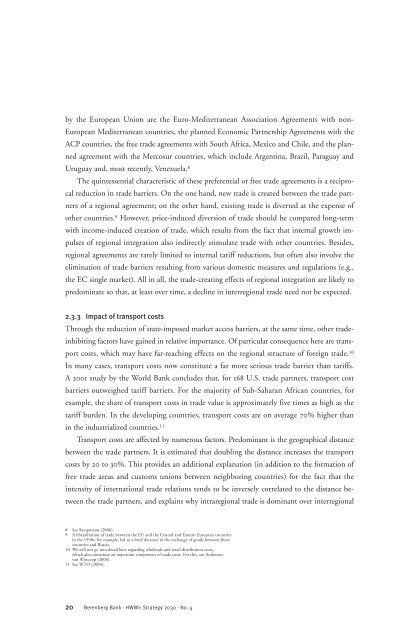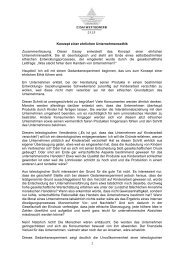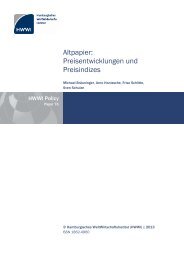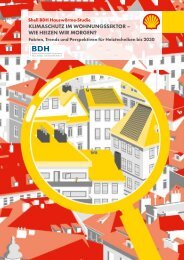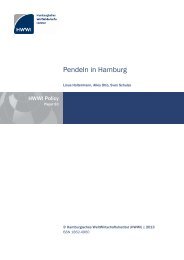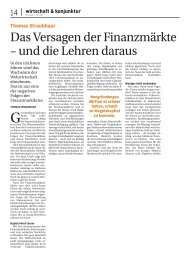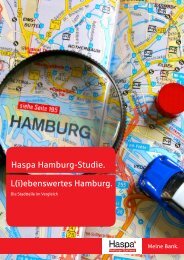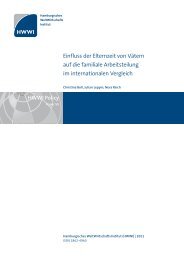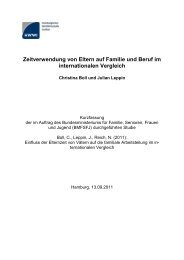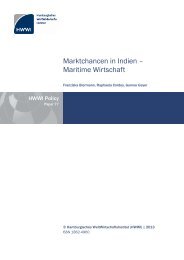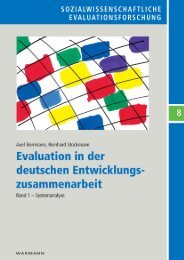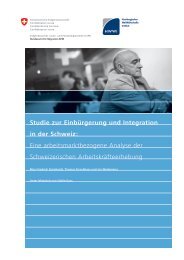Maritime Trade and Transport - HWWI
Maritime Trade and Transport - HWWI
Maritime Trade and Transport - HWWI
You also want an ePaper? Increase the reach of your titles
YUMPU automatically turns print PDFs into web optimized ePapers that Google loves.
y the European Union are the Euro-Mediterranean Association Agreements with non-<br />
European Mediterranean countries, the planned Economic Partnership Agreements with the<br />
ACP countries, the free trade agreements with South Africa, Mexico <strong>and</strong> Chile, <strong>and</strong> the planned<br />
agreement with the Mercosur countries, which include Argentina, Brazil, Paraguay <strong>and</strong><br />
Uruguay <strong>and</strong>, most recently, Venezuela. 8<br />
The quintessential characteristic of these preferential or free trade agreements is a reciprocal<br />
reduction in trade barriers. On the one h<strong>and</strong>, new trade is created between the trade partners<br />
of a regional agreement; on the other h<strong>and</strong>, existing trade is diverted at the expense of<br />
other countries. 9 However, price-induced diversion of trade should be compared long-term<br />
with income-induced creation of trade, which results from the fact that internal growth im -<br />
pulses of regional integration also indirectly stimulate trade with other countries. Besides,<br />
regional agreements are rarely limited to internal tariff reductions, but often also involve the<br />
elimination of trade barriers resulting from various domestic measures <strong>and</strong> regulations (e.g.,<br />
the EC single market). All in all, the trade-creating effects of regional integration are likely to<br />
predominate so that, at least over time, a decline in interregional trade need not be expected.<br />
2.3.3 Impact of transport costs<br />
Through the reduction of state-imposed market access barriers, at the same time, other tradeinhibiting<br />
factors have gained in relative importance. Of particular consequence here are transport<br />
costs, which may have far-reaching effects on the regional structure of foreign tra de. 10<br />
In many cases, transport costs now constitute a far more serious trade barrier than ta riffs.<br />
A 2001 study by the World Bank concludes that, for 168 U.S. trade partners, transport cost<br />
barriers outweighed tariff barriers. For the majority of Sub-Saharan African countries, for<br />
example, the share of transport costs in trade value is approximately five times as high as the<br />
tariff burden. In the developing countries, transport costs are on average 70% higher than<br />
in the industrialized countries. 11<br />
<strong>Transport</strong> costs are affected by numerous factors. Predominant is the geographical distance<br />
between the trade partners. It is estimated that doubling the distance increases the transport<br />
costs by 20 to 30%. This provides an additional explanation (in addition to the formation of<br />
free trade areas <strong>and</strong> customs unions between neighboring countries) for the fact that the<br />
intensity of international trade relations tends to be inversely correlated to the distance between<br />
the trade partners, <strong>and</strong> explains why intraregional trade is dominant over interregional<br />
8 See Koopmann (2006).<br />
9 A liberalization of trade between the EU <strong>and</strong> the Central <strong>and</strong> Eastern European countries<br />
in the 1990s, for example, led to a brief decrease in the exchange of goods between these<br />
countries <strong>and</strong> Russia.<br />
10 We will not go into detail here regarding wholesale <strong>and</strong> retail distribution costs,<br />
which also constitute an important component of trade costs. For this, see Anderson,<br />
van Wincoop (2004).<br />
11 See WTO (2004).<br />
20 Berenberg Bank · <strong>HWWI</strong>: Strategy 2030 · No. 4


